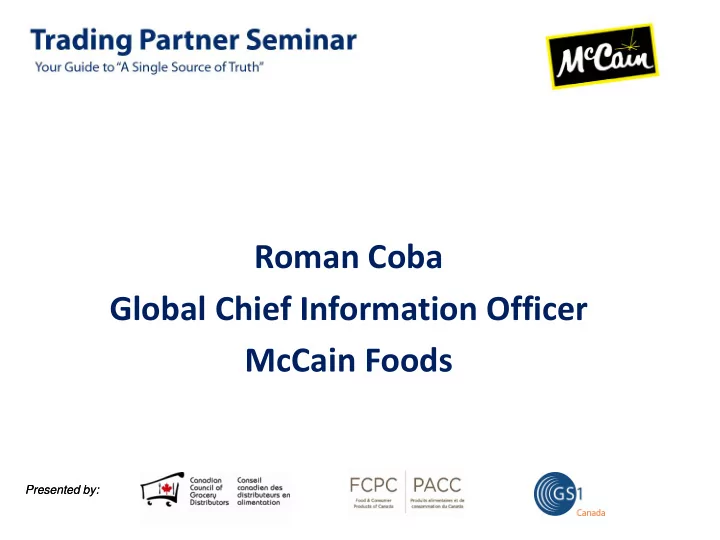

Roman Coba Global Chief Information Officer McCain Foods Presented by: Presented by:
McCain Foods Limited is a privately ‐ owned, multinational leader in the frozen food industry. McCain Foods is the world's largest producer of frozen French fries and the manufacturer of other quality food products sold in more than 110 countries. McCain Foods Limited began production with one small frozen French fry plant in Florenceville, New Brunswick, Canada in 1957. Today the company has more than 55 production facilities on six continents supported by more than 20,000 employees. Over the years McCain has succeeded in becoming the world's largest processor of French fries — the company processes nearly one third of the world's French fries. While frozen potato products remain the foundation of McCain success, McCain products now include not only a complete line of French fries and potato specialties, but also green vegetables, desserts, pizzas, juices and beverages, oven meals, entrees, appetizers and other quality food products. Presented by: Presented by:
Why data integrity is important Customer satisfaction – at the shelf/table • Seamless partner integration • Less human touch points • Speed to market • Reduction of work efforts • Increased focus on what counts • Presented by: Presented by:
Current Flow (workflow based) Packaging Product Maint. Develop’t (data ent) Data Entry Master Catalogue Daily Load Formula & Go Mgmt GS1 (auto) Validate & approve Mkt’g (mktg) ERRORS Presented by: Presented by:
Consequences of inaccurate data Additional touch points • Questioning of the relationship – deterioration • Impact on “Speed” to market • Supply Chain bottlenecks • Increased workload – investigation and rework on • both sides Data sync – goes to out ‐ of ‐ sync • Presented by: Presented by:
What did the Audit reveal? GS1 upgrades are necessary • Detailed error reporting required • Automated notification would help • Tighter editing rules and process • Majority of issues are in 2 areas: • Product dimensions • Who has the right values • Information sharing – product life • Discontinued or “too early” • Presented by: Presented by:
The future? Focus on best practices: 1 point of contact internally for issues • Validation daily of all errors outstanding • Determine “root cause” of issues – “us” or “them” • Build strong relationships with our customers • Clear notification of issues to GS1 • 24 ‐ 48 hour turnaround of issue • Automate – everywhere necessary • Presented by: Presented by:
Future recommendations to increase alignment: Work needs to be done at GS1 • Connect end customer to manufacturer (tighter) • Work on GS1 edit rules and processes (fragmented) • Detailed error descriptions from GS1 (speed) • Automated notifications of errors (speed & focus) • Archive/search capability for historical error logs • Increase speed of information for new listings • Tighter integration with customer – “them v.s. us” issues • Increase frequency of audits and speed to reporting • Increase frequency of data syncs to retailer • Presented by: Presented by:
Thank ‐ you Presented by: Presented by:
Recommend
More recommend